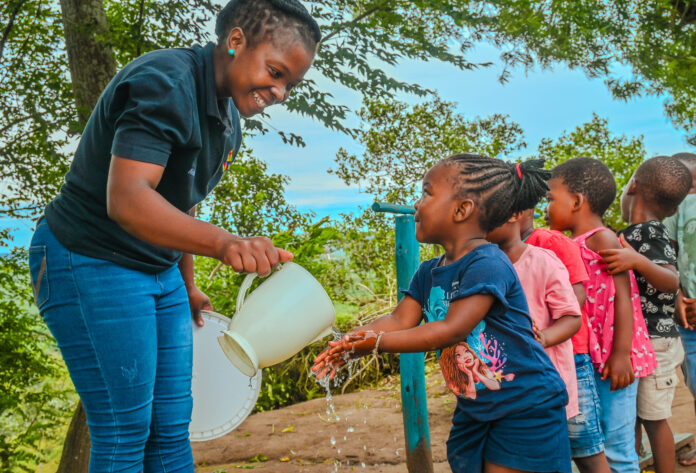
Amid the annual dry season, many areas are bracing for worsening water shortages. In some areas, up to 70% of residents rely on rivers for their daily water needs, with no access to formal water services. However, in the rural community of Magwaza, a powerful example is emerging; one that shows how access to clean water, early childhood education, and food security can be addressed together and create lasting change.
When nonprofit Thanda began working in Magwaza, access to clean water was uncertain, early education was out of reach, and growing food was a challenge. Since partnering with the community, that has started to change.
“It’s not just about clean water. It’s about what happens when people are seen, supported, and believed in,” says Angela Larkan, Co-Founder and Executive Director of Thanda. “We know systemic change doesn’t come from a single solution – it comes from many small, meaningful steps taken together. That’s what we see in KwaMagwaza, and that’s what gives us hope.”
The transformation began with a simple act of generosity. Duduzile Mvubu – known as MaMvubu – offered her home to host one of Thanda’s early childhood development (ECD) groups. “Children were walking an hour to get to Thanda’s Ntengo ECD,” she recalls. “Some just stopped going. I wanted to help.”
Her daughter, Nelisiwe Mvubu, was watching. “When my mother offered our home, I didn’t mind. I saw the need.” At the time, Mvubu was unemployed and raising her child on a social grant. But soon after, she was hired by Thanda as an ECD facilitator – a job that changed her life. “I used to feel like I was floating. Now I feel direction. I can provide for my child. It’s a relief.” Mvubu adds, “What I enjoy about working with children using Thanda’s curriculum is that we learn through play. I find myself learning new things and exploring with the children. I’m not only teaching – I’m also growing.”
In rural KwaZulu-Natal, water is both a necessity and a challenge. “We had no tanks,” Mvubu remembers. “We drank the same water as cows. The municipal tank came later, but it’s a 30-minute walk, with four 20-litre buckets.”
With Thanda’s support, the Mvubu home and many others now have access to clean water through a spring protection system and storage tank installed nearby, ensuring a steady flow, even during the dry season. “We use the water every day for our home and the ECD children – for cooking, washing hands, even mixing paint,” Mvubu says. “Relief. That’s the word. We finally have relief.” MaMvubu agrees: “Even when the path to the tank is overgrown from rain, just knowing it’s there is a comfort. It makes us feel like we are seen.”
For community member Mabuyi Myende, the change is not only physical but social. “I used to fetch water from a stream with dogs playing in it. I thought: this is not life. Now I fetch from the tank, and I know I’ll see MaMvubu or Neli. We chat. We laugh. The tank has become a meeting place.”
The impact extends beyond water. Mvubu’s ECD group now sends well-prepared learners to local schools. “Teachers say Thanda kids are more confident, curious, and ready,” Mvubu smiles. “One guardian said her daughter already knows rhymes and loves to read.” Recent Early Learning Outcomes Measure (ELOM) assessments of Grade 000 learners in the group reflect this progress: 80% of children are on track in cognitive and physical development, and 40% are already on track in numeracy and creativity. While many are still developing in language and social-emotional skills, none are falling far behind in key areas like creativity or general knowledge – a promising sign for a community where early education was once entirely out of reach.
In addition, the nearby Thanda-supported community farm has provided nutritious food, a pathway to self-sufficiency and purpose, and a source of joy for many individuals. “One day, I was in a taxi and I saw a lovely green field. I said out loud, ‘This is so lovely and there’s so much food – we need it in our community too.’ One of the women in the taxi replied, ‘It’s Thanda’s work.’” adds MaMvubu.
“Last Christmas was the best we’ve had,” Mvubu laughs. “We had cabbages, spinach, even brinjal – our first time eating it!” Even Myende, who once worried she couldn’t afford clean water, now feels secure. “Thanda gave us water without asking for anything.”
KwaMagwaza’s story is a powerful reminder: clean water isn’t just about survival – it’s about dignity, connection, and the domino effect of change. As South Africa faces a growing water crisis and KZN enters a dry season with limited rainfall, holistic, community-driven models like this one point to a way forward – not just in KwaMagwaza, but in rural areas across the country.
“This work isn’t fast and it isn’t flashy,” says Larkan. “But it’s real. It’s rooted. And it works.”
As Mvubu puts it, “We were forgotten. But now, we are moving forward. And the future seems hopeful.”







